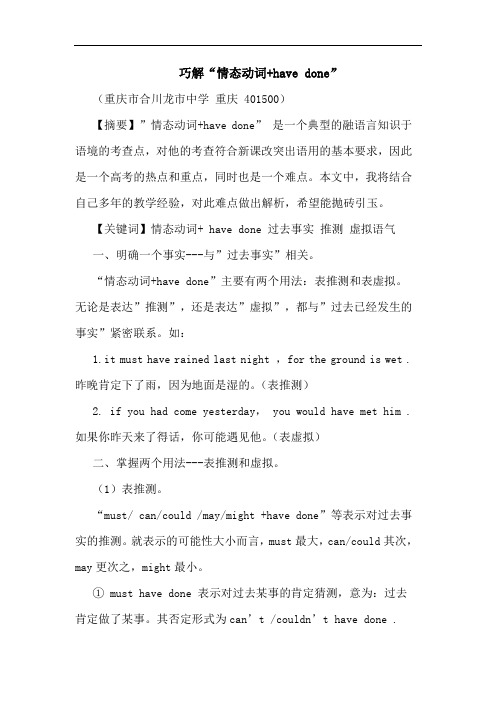情态动词 have done难点突破 (2)
情态动词have_done

情态动词+have+done是历年高考的重点和难点之一,现将其用法总结归纳如下:一、must+have+done表示对过去事情的肯定推测,译成“一定做过某事”,该结构只用于肯定句.1. It must have rained last night, for the ground is wet. 昨晚一定下雨了,因为地面还是湿的2. You must have been mad to speak to the servant.你和仆人说话,一定是发疯了二、“can't+have+done”表示对过去事情的否定推测,译成“不可能做过某事”。
1. Mr. Smith can't have gone to Beijing, for I saw him in the library just now. 史密斯先生不可能去北京了,我刚才还在图书馆见过他。
2.Mary can't have stolen your money. She has gone home.玛丽不可能偷你的钱,她回家去了三、“can+have+done”表示对过去行为的怀疑,用于疑问句,译成“可能做过……吗?”。
1.There is no light in the room. Can they have gone out?屋里没有灯,他们可能出去了吗?2. There is nowhere to find them. Where can they have gone? 到处找不到他们,他们可能到什么地方去呢?四、could+have+done’是虚拟语气,表示对过去事情的假设,意思是本来能够做某事而没有做.He could have passed the exam, but he was too careless.本来他能通过考试,但他太粗心五、“may+have+done”表示对发生过的事情的推测,意思是“可能已经”或“也许已经”,用于肯定句中。
情态动词+have-done用法

情态动词+h a v e-d o n e用法(总2页)--本页仅作为文档封面,使用时请直接删除即可----内页可以根据需求调整合适字体及大小--情态动词+have done (have been doing )一、教学目标情态动词+have done (have been doing ) 的用法二、生成问题情态动词+have done (have been doing ) 的用法有哪些1、should(ought to)+have done (have been doing )表示“本来应该做而实际上没做”,其否定式表示“本来不该做却做了”,常含有责备的语气。
You should have been here five minutes ago.五分钟之前你就应该到这里了。
How I regretted the days when I had played and should have studied.我多么懊悔我本应该好好学习的日子都玩掉了。
We shouldn’t have been resting so long.我们真不该休息这么长时间。
2、could+have done表示“本来有能力做而实际上没有做”。
—We could have walked to the station, it was so near.这么近,我们完全能走着来车站。
—Yes. A taxi was not at all necessary.是呀,根本不必搭车的。
I could have won if I hadn’t fallen over.要不是摔倒,我准能赢。
3、needn’t+have done表示“本来不必做的事,实际上做过了”。
I got up early, but needn’t have done so, because I had nothing to do that morning.那天早上我起得很早,可我根本不必起这么早,因为我无事可做。
高一必修四重点难点情态动词havedone

高一必修四重点难点情态动词h a v e d o n e文稿归稿存档编号:[KKUY-KKIO69-OTM243-OLUI129-G00I-FDQS58-情态动词+have+done情态动词+have+done在高考中所占分值为2分左右,常以单选或语篇填空、改错题的方式出现。
其用法总结归纳如下:一、“must+have+done”表示对过去事情的肯定推测,译成“一定做过某事”,该结构只用于肯定句。
1. It must have rained last night, for the ground is wet. 昨晚一定下雨了,因为地面还是湿的。
2. You must have been mad to speak to the servant. 你和仆人说话,一定是发疯了。
二、“can't+have+done”表示对过去事情的否定推测,译成“不可能做过某事”。
1. Mr. Smith can't have gone to Beijing, for I saw him in the library just now. 史密斯先生不可能去北京了,我刚才还在图书馆见过他。
2. Mary can't have stolen your money. She has gone home. 玛丽不可能偷你的钱,她回家去了。
三、“can+have+done”表示对过去行为的怀疑,用于疑问句,译成“可能做过……吗”。
1. There is no light in the room. Can they have gone out? 屋里没有灯,他们可能出去了吗2. There is nowhere to find them. Where can they have gone? 到处找不到他们,他们可能到什么地方去呢四、“could+have+done”是虚拟语气,表示对过去事情的假设,意思是本来能够做某事而没有做。
巧解“情态动词+have done”

巧解“情态动词+have done”(重庆市合川龙市中学重庆 401500)【摘要】”情态动词+have done”是一个典型的融语言知识于语境的考查点,对他的考查符合新课改突出语用的基本要求,因此是一个高考的热点和重点,同时也是一个难点。
本文中,我将结合自己多年的教学经验,对此难点做出解析,希望能抛砖引玉。
【关键词】情态动词+ have done 过去事实推测虚拟语气一、明确一个事实---与”过去事实”相关。
“情态动词+have done”主要有两个用法:表推测和表虚拟。
无论是表达”推测”,还是表达”虚拟”,都与”过去已经发生的事实”紧密联系。
如:1.it must have rained last night ,for the ground is wet . 昨晚肯定下了雨,因为地面是湿的。
(表推测)2. if you had come yesterday, you would have met him .如果你昨天来了得话,你可能遇见他。
(表虚拟)二、掌握两个用法---表推测和虚拟。
(1)表推测。
“must/ can/could /may/might +have done”等表示对过去事实的推测。
就表示的可能性大小而言,must最大,can/could其次,may更次之,might最小。
① must have done 表示对过去某事的肯定猜测,意为:过去肯定做了某事。
其否定形式为can’t /couldn’t have done .例句:1.the lights were out .they must have been asleep .2. i think that he couldn’t/can’t have gone abroad. i saw him just now.【真题再现】-she looks very happy. she ______ have passed the exam.-i guess so. it’s not difficult after all. (2007 江苏)a. shouldb. couldc. mustd. might【解析】此题考察情态动词表推测的用法。
情态动词 + have done用法初探跟踪训练(二)

“情态动词+have + 过去分词”跟踪练习I. Complete the sentences:1. 她爸爸认为她一定遇上了仙女。
Her father thought that ________________.2. 我没有听到电话铃声,我一定是睡着了。
I didn’t hear the telephone,__________ ____.3. 他还没来。
他也许没赶上那班火车。
He’s not come yet. He ________________.4. 到开会的时间了,想必他们现在已经到了。
It’s time for the meeting. They ____________ by now.5. 如果我没有成为盲人,我可能不会像现在这样热爱生活。
________________ to love life as I do if I hadn’t been blind.II. Choose the best answer:1. Sorry, I’m late. I ______ have turned off the alarm clock and gone back to sleep again.A. mightB. canC. mustD. will2. Where is my cellphone? I ______ it.A. would have lostB. may lostC. must have lostD. might lost3. Yesterday Jane walked away from the discussion and she ______ something shewould regret later.A. has saidB. might have saidC. might sayD. had said4. Ms Huang ______ have arrived in Beijing this morning, didn’t she?A. mayB. mightC. mustD. shouldKeys:I. 1. she must have met a fairy2. I must have been asleep3. may have missed the train4. must have arrived there5. I might not have comeII.1—4 CCBC。
破解“情态动词+havedone”的用法

破解“情态动词+havedone”的用法作者:汪璇来源:《高中生·高考指导》2015年第04期请同学们先看看下面这道题并完成句子:Most believe he _____ for England last week, but for a serious injury which put him out of football. (play)解析:考查but for含蓄条件虚拟语气,题干中有last week,可知是对过去情况的虚拟。
句意为:“多数人认为,要不是受了重伤而告别足球,上周他本会为英格兰踢球的。
”因此正确答案是could / would have played。
“情态动词+have done”结构是历年高考试题中的必考项,也是同学们常常容易混淆的考点之一。
近年来,“情态动词+have done”结构的试题新颖,而且有效的信息越来越隐蔽,综合性也越来越高,无疑增加了考题的难度。
因此,仔细区别具有相同功能的、意思相近的情态动词的用法,是突破这一难点的有效措施。
简单来说,“情态动词+have done”这一结构有两大功能:一是表示推测,二是表示虚拟。
1.“ must+ have done”表示对过去情况的肯定推测,用于肯定句中,意为“一定做过某事”。
例1 The children _____ in the woods;otherwise, they would have been at the lakeside camp as scheduled. (get lost)解析:句意为:“孩子们一定是在树林里迷路了,不然按照计划他们应该已经在湖边了。
”从句中有would have been,可知与过去事实相反,前面应用“情态动词+完成式”,因此答案是must have got lost。
例2 Harry is feeling uncomfortable. He _____ too much at the party last night. (drink)解析:句意为:“哈利感觉不舒服,他一定是在昨晚的聚会上喝多了。
2025高考英语一轮总复习情态动词和虚拟语气考点四“情态动词+havedone”的2类用法(含答案)
高考英语一轮总复习考点突破:
考点四“情态动词+have done”的2类用法
一、对过去发生的事情或状态进行推测
我们本来可以一起面对困难,但是你为什么不告诉我?
Mark needn't have hurried.Driving at top speed, he arrived half an hour early.
马克本不必着急。
他开得飞快,早到了半小时。
即时演练(四)
单句语法填空
1.Your cousin must have enjoyed his trip in Jixian County, didn't he? He looks amazingly different.
2.The spokesman did not regret what he had said at the conference but felt that he could have expressed (express) it indirectly.
3.This may have been an improvement, but “breakthrough” was an overstatement.
4.I'm not feeling well in the stomach. I shouldn't have eaten (eat) so much fried chicken just now.
5.You ought to have come (come) to the party yesterday, but why didn't you
come?。
浅析高考试题中情态动词+have done重难点及用法
- 161 -校园英语 / 基础教育浅析高考试题中情态动词+have done重难点及用法陇南市武都区钟楼小学/杜全福【摘要】“情态动词+have done”是情态动词语法项目中一个十分重要的语言点,是高考的重点,也是近年来各省市高考英语试题考查的热点内容。
情态动词have done有两大功能:一是表示推测;二是表示虚拟。
【关键词】情态动词 用法 高考题 虚拟语气 高考英语情态动词是高中阶段一个难以掌握的语法项目,且一直是高考的重点和难点。
下面笔者结合近年来高考英语试题谈谈“情态动词+have done ”的几种常见但却容易混淆的用法:一、must+ have+过去分词:表示对过去发生动作或存在的状态进行推测。
只用于肯定的陈述句中(在否定句及疑问句中用can)意思是“一定、已经”。
e.g: If he had already been there, I must have been seen him.Her watch must have stopped .I will go and call her. 【高考链接】Jack described his father, who ___ a brave boy many years ago, as a strong-willed man.A. would beB. would have beenC. must beD. must have been (2010安徽卷,32)【答案】 D 【简析】此题考查情态动词must 表示推测的用法,推测过去用must +have done 的结构,正确答案为选项D 。
二、may\might + have +过去分词:表示对过去发生动作或存在的状态进行不肯定的推测。
可用于肯定句(意思是“可能已经”、也许)和否定句(意思是“可能没有”);might 的语气没有may 那么肯定。
might + have +过去分词:还可表示“本来可能......”,但实际上没有发生的事;另外,还可表示“本来应该或可以做某事”之意,含有轻微的责备语气。
情态动词+havedone用法总结
情态动词+ have done的用法总结一、“must+have+done”表示对过去事情的肯定推测,译成“一定做过某事”,该结构只用于肯定句。
1. It must have rained last night, for the ground is wet. 昨晚一定下雨了,因为地面还是湿的。
2. You must have been mad to speak to the servant. 你和仆人说话,一定是发疯了。
二、“can't+have+done”表示对过去事情的否定推测,译成“不可能做过某事”。
1. Mr. Smith can't have gone to Beijing, for I saw him in the library just now. 史密斯先生不可能去北京了,我刚才还在图书馆见过他。
2. Mary can't have stolen your money. She has gone home. 玛丽不可能偷你的钱,她回家去了。
三、“can+have+done”表示对过去行为的怀疑,用于疑问句,译成“可能做过……吗?”。
1. There is no light in the room. Can they have gone out? 屋里没有灯,他们可能出去了吗?2. There is nowhere to find them. Where can they have gone? 到处找不到他们,他们可能到什么地方去呢?四、“could+have+done”是虚拟语气,表示对过去事情的假设,意思是本来能够做某事而没有做。
He could have passed the exam, but he was too careless. 本来他能够通过考试,但是他太粗心。
五、“may+have+done”表示对发生过的事情的推测,意思是“可能已经”或“也许已经”,用于肯定句中。
高中英语新人教版精品教案《情态动词+have done》
情态动词have done教学思路
一、教学目标:
学生能够掌握情态动词have done的两种用法:
1.学生能够从具体的语境中判断情态动词have done是表推测,还是表虚拟。
2能够正确的运用情态动词have done
二、教学重点:
情态动词have done
三、教学难点:
1情态动词done对过去的可能性进行推测;
2.情态动词done表示与现在事实相反的虚拟语气。
四、教学步骤:
1、预告之学习内容
2、情景导入
(1)The ground i wet What hainute ago
6归纳总结,得出虚拟语气的定义。
7用表格对比学习情态动词have done表猜测和表虚拟的情况8介绍判断情态动词have done是表猜测还是表虚拟的情况。
9讲解练习题巩固
10听情态动词之歌再一次巩固情态动词。
- 1、下载文档前请自行甄别文档内容的完整性,平台不提供额外的编辑、内容补充、找答案等附加服务。
- 2、"仅部分预览"的文档,不可在线预览部分如存在完整性等问题,可反馈申请退款(可完整预览的文档不适用该条件!)。
- 3、如文档侵犯您的权益,请联系客服反馈,我们会尽快为您处理(人工客服工作时间:9:00-18:30)。
情态动词+have done的结构和用法
情态动词+have done的结构和用法有以下几种:
一、must have done sth.一定做某事。
表示对过去事情的较有把握的推测,这时只能用在肯定句中,“肯定/必须已经干过…”,在否定句和疑问句中用can't或couldn't或can/ could,例如:
1.From what you said, she must have told you all about it.
从你的话看,她一定告诉了你所有的事情。
2.The light was out. They must have gone to bed.
灯都熄了,他们必定睡了。
3.He must have done it when I was off with those assholes.
他一定是趁我和那群混蛋一起的时候做的。
4.The man must have done something right, more right than all jumpers before.
这个人一定是做了些很对的事,比所有以前跳高的做得更对。
5.China must have done something supremely right to produce the economic miracle we observe.
中国一定是做了非常对的事才产生了我们见到的经济奇迹。
6.You must have done something to her.
你一定有跟她做什么事。
7.He must have done sometime. Certainly he had always been jealous of him as a child.
有时他肯定爱,当然他总是忌妒弟弟,像一个小孩子。
二、can/could have done sth.本来能够做某事,而实际上未做
1.But we could have done it all so much better.
但是,我们本可以把这一切做得更好。
2.If you do a good job, you may tell yourself that it wasn’t good enough or that anyone could have done as well.
比如你完成了一项出色的工作,你或许告诉你自己它不够好,任何人都可以做的像你一样好。
三、can't/couldn't have done sth.不可能做过某事
1.I could't have done it without you.
若是没有你,我不可能做到那样的。
2.We could't have done it without you.
没有你我们办不成这事。
四、ought to/should have done sth.过去本应该做某事而实际上并没有做
1.You should have done it when you first saw them blooming this spring.
你应该在今年春天第一次看到它们盛开的时候就挖一些的。
2.Even if it’s something you should have done earlier in the week or missed a detail on. 甚至你在一个星期前的就提早完成了一件事或者忽略了一个小细节。
